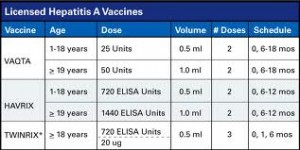To vaccinate or to not vaccinate is often a point of dispute, especially if new vaccinations come into the forefront. Often the vaccinations have been used for a long time in areas where certain diseases were a threat to the population.
Hepatitis vaccines have been tried and tested for a long time (for hepatitis A and B). They have made their way into TV commercials, warning travelers to get vaccinated before they embark on exotic trips. It is true that the ice cube in a tropical drink could be the source of hepatitis, but it is a fallacy to believe, that staying home means being safe from hepatitis A and B. The demographics are also different: it is not only adventurous adult travelers that can get infected with hepatitis. Children share the same risk. They don’t even have to travel!
In October 2005, the Advisory Committee on Immunization Practices, an advisory panel to the United States Centers for Disease Control and Prevention, recommended that all children age 12 to 23 months should receive a hepatitis vaccination. The vaccination would protect the young population not only against endemic but also imported viruses. A common source of infection can be agricultural products. Vaccination reduced the incidence of infection by 80% between 1999 and 2003.
There is always the question, whether this is just one vaccination too many, but bearing in mind that hepatitis can be a killer, the answer is more obvious.
Hepatitis A has devastating consequences when super-imposed on chronic hepatitis C. Hepatitis C has been on the rise in the U.S., and there is no vaccination available. In order to avoid more serious consequences it is very likely of benefit to vaccinate children early.
More information about hepatitis: http://nethealthbook.com/infectious-disease/sexually-transmitted-disease/viral-hepatitis/
Reference: BMJ 2006; 332:715-718 (25 March)
Last edited Oct. 31, 2014






